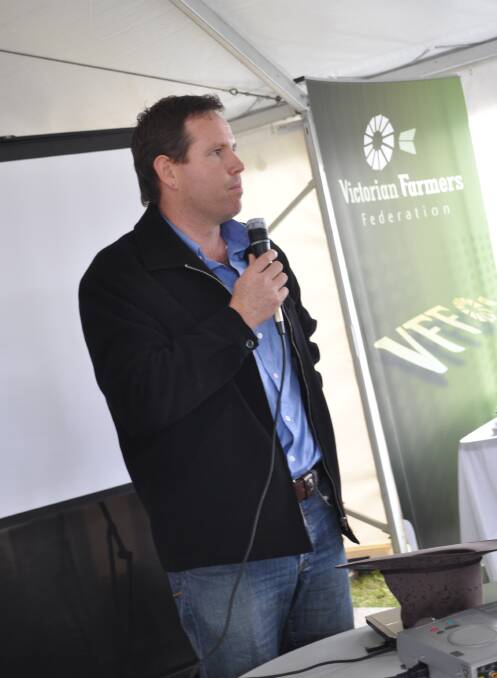
The dust has settled on the Andrew Broad scandal, the memes are slowing down and gradually people have had their fill of the schadenfreude that went with seeing someone who had positioned themselves on a moral pedestal fall so spectacularly from grace.
It is time, then, to have a look at just what went wrong, not simply to rake over old coals but to see whether Mr Broad’s demise is symptomatic of a greater malaise within rural politics.
All across Australia rusted-on National Party voters are dropping off and the message is clear, the Nats need to burst out of their torpor and stop relying on old glories and personal loyalties to maintain their stranglehold on rural seats.
Mr Broad’s fall mirrors the party’s fortunes of late, a man who had done good work in the past but who had become a little too comfortable with his position.
While the lasting memories of many for Mr Broad will be of a smug and sanctimonious hypocrite unwilling to live by the strict moral code he was all too happy to apply to others, many within the rural sector are quick to point out there was more to the man than that.
Long before he was a punchline for comedians across the globe, Mr Broad, through a strong work ethic, had positioned himself for a lengthy stint in public life.
He had built up a small farm, supplementing his on-farm income with shearing industry work and was passionate about agriculture, always generous with sharing his knowledge from a 2006 Nuffield Scholarship investigating canola agronomy.
From there he became involved in the Victorian Farmers Federation where his youthful presence was welcomed as a breath of fresh air, with the VFF, like most agri-political organisations, traditionally the domain of older farmers.
He soon found himself at the helm of the organisation, the youngest ever president, aged just 33.
The Victorian ag sector overall speaks favourably about his time at the helm.
While it was clear to most that the president’s gig would be used, as it has been by others several times before, as a stepping stone to bigger and better things, he managed worthwhile reform at the group, including the passing of a new constitution.
When John Forrest announced his intention to retire from the seat of Mallee, Mr Broad ambitiously threw his hat in the ring and in a packed field of pre-selection candidates worked a tireless campaign to get over the line, in spite of murmurings of the fact he was not local.
In north-west Victoria, the hard bit of political life is regarded as getting Nats pre-selection, from there, traditionally it is said the proverbial dead drover’s dog, provided it had Nats’ backing, would start raging favourite in the election proper.
True to the seat’s history, Mr Broad won the election at a relative canter, and as a youngish man of 38, a quarter of a century in politics, should he desire it, was very much on the cards.
But it was within this position of near virtual absolute power that the cracks started appearing.
He became increasingly unwilling to discussing matters not of his choosing, instead focusing on whatever issue he deemed was important to people in his electorate, rather than listening to the concerns of the people who voted him in.
Restless local voters felt their status as an untouchably safe Nationals seat was costing them in terms of a share of the funding pie, and saw Mr Broad’s relentless focus on maintaining hardline Christian conservative values as distracting from his efforts as a local member.
His messaging on matters such as same sex marriage, with the infamous ‘two rams’ quip, may well have hit the mark in some rural corners of his seat, but was not viewed favourably in the larger urban centres such as Mildura and Horsham.
It had the hallmarks of a man far too comfortable with his own role, which, retrospectively must have been the case.
How else could someone get tied up in such a salacious scandal when their whole public persona was so much as the clean cut boy next door.
With Mr Broad falling on his own sword, his political chapter is closed, but there is a cautionary tale the rest of the National Party would do well to heed.
His position as good as untouchable in an electoral sense is one repeated in many rural-based seats across the country and the line about power corrupting rings true.
The current National Party’s performance can only be described as complacency writ large and the top-down method of representation is far from limited to Mr Broad.
By a number of metrics there is significant disadvantage for people in rural areas compared to their urban counterparts, hardly the sign of the party for the country kicking goals, yet the Nats keep telling all of us in the country what a good job they are doing for on our behalf.
The constant over promising and under delivery is taking its toll, with more and more voters disconnecting from the Nats.
Indeed, prior to Mr Broad’s disgrace, in the Victorian state seat of Mildura, encompassed in his Mallee electorate, Ali Cupper, an independent with previous ALP affiliations, was elected, a virtually unthinkable result as recently as five years ago.
At the Federal level, the Nats will also be up against it, with a strong independent candidate in Wimmera farmer Ray Kingston and constant rumours of the Liberals parachuting in a high profile runner in former chief of staff for Tony Abbott, Peta Credlin, who has family links to the Mallee region.
The Nats will be worried, and rightly so.
Rural Australia is delivering a blunt message: it’s time to stop taking your constituents for fools, doing as you please and telling them how lucky they are to have you and to start listening – or the trickle of lost Nationals seats will become a flood.


